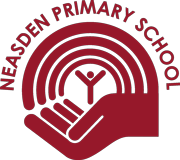Our Approach to Writing
At Neasden Primary School, we believe that teaching children to understand the power of writing is an important part of our job as teachers. We believe that if we equip the children with the correct writing tools, they will be able to use them effectively within a literate world.
Children at Neasden Primary are provided with a stimulating writing environment in which we offer encouragement and good quality modelling of writing. We have clear expectations of writing and to communicate these targets to the children. We have high expectations of the finished writing product and to encourage the children to maintain the same standards at all times.
Developing writing
In order to for our pupils to become effective and successful writers, we aim to teach them to
Extended Writing Time (Big Writing)
We also set aside time for extended or sustained writing. This is known as Big Writing. ’The Big Write’ occurs once a week and gives children the experience of writing for a longer period of time. For example, it may be important after demonstrating how to draft a particular text type the day before, to allow the children more time to draft a text themselves. They may need more than 20 minutes independent time to do this and so may be given an extension of time. Big Writing strategies are reflected our writing working walls, which are present in each class room.
Speaking and Listening
Speaking and Listening is a vital step in enhancing children’s writing. Our Children are given the opportunity to use a variety of techniques such as, response partners, role play, hot seating and drama. In this way children can develop their ideas and language skills and therefore improve their writing.
Speaking and listening activities are also central to the Big Write approach being used weekly in each class. Big writing is the development of ‘the writing voice’ through fast, fun, lively and predominantly oral activities. Pupils talk ‘the writing voice’ in their Big Writing sessions and at other points during the week. This is based on the premise that pupils will learn and develop the ideas, vocabulary and higher level grammatical structures needed to improve their writing through talk.
In Foundation Stage, practitioners also follow the recommendations of the National Strategies resource ‘Mark Making Matters’. Within the Foundation Stage both the indoor and outdoor environment has resources to support the children’s mark making, drawing and writing. It is ensured that the children have opportunity to use mark making, drawing and writing to explore and develop their own interests, by providing an environment in which creativity, originality and expressions and valued.
The children are given time and space to concentrate on mark-making activities using a wide variety of resources that are challenging and interesting and can be used in a variety of ways as they express their thoughts, ideas and understanding.
Practitioners involve themselves in the children’s mark-making by modelling the process and reordering children’s thoughts.
The Teaching of Spelling
The teaching of spelling has been given considerable thought in Neasden Primary School as it is an important aspect of writing. The fundamental principles and the practice of teaching spelling in our school can be found in our Spelling Policy. Our main concern in writing is that spelling must not be allowed to dominate our responses to children’s writing.
Very good efforts at writing can often be dismissed because of basic spelling errors and this can damage a child’s perception of him/herself as writers. We try to have a more positive and interactive approach to spelling that enables children to explore spelling patterns and investigate how words are constructed. When drafting writing, children are encouraged to have a go at unfamiliar spellings in order to continue the creative flow.
Teachers ensure that they cover the relevant spelling objectives within the Literacy lesson. The National Curriculum ‘is the document on which our teaching of spelling is based.
